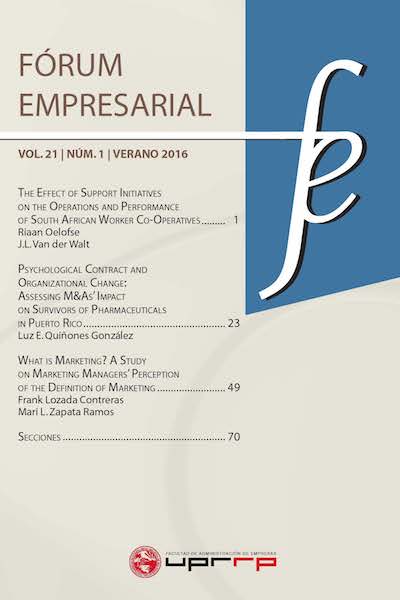Abstract
Several authors indicate that there is confusion about what marketing is, because there are multiple definitions and interpretations established in academic literature. This multiplicity about the conceptualization of marketing complicates the development of marketing functions and contributes to its decline within organizations. This study uses content analysis techniques to explore how marketing managers define the concept of marketing in Puerto Rican companies. The results show that 16% of managers define it using concepts related to strategic functions, 50% define it using concepts related to marketing tactics, and 28% state that it reflects both functions.References
Beverland, M., & Luxton, S. (2005). Managing integrated marketing communication (IMC) through strategic decoupling: How luxury wine firms retain brand leadership while appearing to be wedded to the past. Journal of Advertising, 34(4), 103-116.
Bolajoko, D. N., Salome I., & Sikuade, J. O. (2013). The concept and philosophy of marketing: Evidence from Nigeria. International Journal of Business Strategy, 13(2), 55-70.
Brooksbank, R., Davey J., & McIntosh, J. (2010a). Time to face up to marketing‘s worldwide identity crisis. International Review of Business Research Papers, 6(4), 262-268.
Brooksbank, R., Davey J., & McIntosh, J. (2010b). Marketing‘s great identity crisis: A revised definition and an urgent research agenda. World Journal of Management, 2(1), 81-97.
Cravens, D. & Piercy, N. (2006). Strategic Marketing. Boston, MA: McGraw Hill.Davidson, H. (2009). How marketing has lost the plot. Market Leader, 44, 24-29.
Detwiler, R. M. (1974). Managing the news for freedom of the press. The Public Relations Journal, 30(2), 6.
Dibb, S., Farhangmehr M., & Simkin, L. (2001). The marketing planning experience: A UK and Portuguese comparison. Marketing Intelligence & Planning, 1(19), 409-417.
Ferrell, O. C., & Hartline, M. D. (2006). Marketing strategy. Mexico, D.F.: Cengage Learning.Futrell, C. M. (2001). Sales management. Mason, OH: South-Western.
Gamble, J., Gilmore, A., McCartan-Quinn, D., & Durkan, P. (2011). The marketing concept in the 21st century: A review of how marketing has been defined since the 1960s. Marketing Review, 11(3), 227-248.
Grönroos, C. (2006). On defining marketing: Finding a new roadmap for marketing. Marketing Theory, 6(4), 395-417.
Gundlach, G., & Wilkie, W. L. (2009). The American Marketing Association‘s new definition of marketing: Perspective and commentary on the 2007 revision. Journal of Public Policy & Marketing, 28(2), 259-264.
Homburg, C., Workman, J. P. & Krohmer, H. (1999). Marketing influence within the firm. Journal of Marketing, 63(2), 1-17.
Homburg, C., Vomberg, A., Enke, M., & Grimm, P. H. (2015). The loss of the marketing department‘s influence: It is really happening? And why worry? Journal of the Academy of Marketing Science, 43, 1-13.
Kerin, R., Hartley, S., & Rudelius, W. (2013). Marketing. Boston, MA: McGraw Hill.Kotler, P. (2004). A three-part plan for upgrading your marketing department for new challenges. Strategy & Leadership, 32, 4-9.
Kotler, P. (2005). According to Kotler. New York, NY: Amacom.
Kotler, P., & Keller, K. L. (2009). Marketing management. Upper Saddle River, NJ: Pearson Prentice Hall.
Kotler, P., & Keller, K. L. (2012). Marketing management. Upper Saddle River, NJ: Pearson Prentice Hall.
Krush, M. T., Sohi, R. S., & Saini, A. (2015). Dispersion of marketing capabilities: Impact on marketing‘s influence and business unit outcomes. Journal of the Academy of Marketing Science, 43, 32-51.
McCarthy, E. J. (1960). Basic Marketing: A managerial approach. Homewood, IL: Richard D. Irwin.
McDonald, M. (2009). The future of marketing: Brightest star in the firmament, or a fading meteor? Some hypotheses and a research agenda. Journal of Marketing Management, 25(5/6), 431-450.
Morgan, F. W. (1984). Punitive damages awards for flagrant mismarketing of products. Journal of Public Policy & Marketing, 3, 113.
Neuendorf, K. A. (2002). The content analysis guidebook. Thousand Oaks, CA: Sage.
Suris, O. (1993). Advertising: Ads aim to sell hush puppies to new yuppies. Wall Street Journal, pp. 84-86.
Verhoef, P. C., & Leeflang, P. S. (2009). Understanding the marketing departments influence within the firm. Journal of Marketing, 73(2), 14-37.
Verhoef, P. C., & Leeflang, P. S. (2010). Getting marketing back into the boardroom: The influence of the marketing department in companies today. GFK-Marketing Intelligence Review, 1(2), 34-41.
Verhoef, P. C., Leeflang, P. S., Reiner, J., Natter, M., Baker, W., Grinstein, A., Gustafsson, A., Morrison, P., & Saunders, J. (2011). A cross-national investigation into the marketing department‘s influence within the firm: Towards initial empirical generalizations. Journal of International Marketing, 19(3), 59-86.
Webster, F. E. (2002). Marketing management in changing times. Marketing Management, 1(11), 18-23.
Webster, F. E. (2005). A perspective on the evolution of marketing management. Journal of Public Policy & Marketing, 1(24), 121-126.
Webster Jr, F. E., Malter, A. J., & Ganesan, S. (2005). The decline and dispersion of marketing competence. MIT Sloan Management Review, 46(4), 35-43.
Wilkie, W. L., & Moore, E. S. (2007). What does the definition of marketing tell us about ourselves? Journal of Public Policy & Marketing, 26(2), 269-276.
Wilkie, W. L., & Moore, E. S. (2012). Expanding our understanding of marketing in society. Journal of the Academy of Marketing Science, 40(1), 53-73.
By submitting a contribution to consideration of the Editorial Board of Fórum Empresarial, the authors attest that it is an original, unpublished work, which has not been nor will be simultaneously submitted to another journal for consideration and publication; that they are responsible for the work carried out and the content of the article; and they have the corresponding copyrights.
The authors grant the right of first publication of their work to Fórum Empresarial, in any medium and physical and electronic format, including internet. Publication shall be subject to the Creative Commons Attribution-NonCommercial 4.0 International License, which allows third parties to share the work, provided that the author and Fórum Empresarial (as a first publication) are cited.
The journal allows authors to retain publishing rights without restrictions. Authors are able to enter into separate, additional arrangements for the non-exclusive distribution of the journal's published version of the work (e.g., post it to an institutional repository or publish it in a book), with an acknowledgment of its initial publication in Fórum Empresarial.

